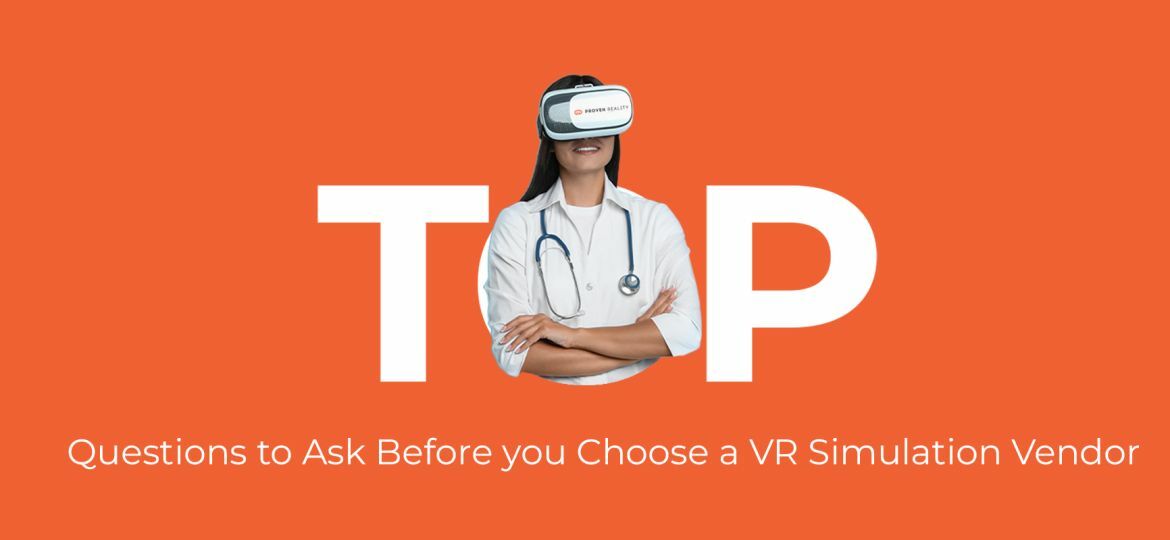
Do you consider leveraging immersive virtual reality (VR) simulations for use in medical education and training for your university? You are not alone if you say “yes.” Healthcare educators worldwide are rethinking how they give simulation-based training as technology evolves. VR is a system that provides teachers the freedom to offer simulations that are adaptable, cutting-edge, and interesting. Because of this, many schools/universities are working with virtual reality service providers to provide thorough, top-notch simulation experiences.
VR simulation providers like PROVEN Reality lend their expertise, software, and skills to build virtual reality resources or platforms that wow learners. However, selecting the ideal vendor can take time and effort, especially choosing the platform that will work best for your curriculum needs and with whom you can partner time and again to expand your training program. We understand that educators are extremely busy navigating the rapidly changing field of VR education. Therefore, we will assist you with the most important questions to ask your VR service provider to save you the expense of finding a provider in your niche and budget.
Is your platform immersive?
The term “VR simulation” is frequently used to refer to a broad range of modalities, from screen-based activities to fully immersive VR. The degree of immersion, or how much the student feels present in the virtual clinical environment, is a key difference between these platforms. Choosing a highly immersive platform has several advantages, as it offers a more participatory experience and is associated with better learning results and knowledge retention.
Immersive VR platforms offer a hands-on, multisensory experience inside a 3D virtual world with students wearing headgear. Students with proprioception can feel their position and motion in the virtual environment. As they navigate the virtual clinical environment, use the virtual tools, evaluate the patient, and carry out medical procedures, they also feel as though they are physically present there. The most immersive platforms provide a hands-on learning experience that resembles actual medical practice by allowing the learner to act freely within the simulated environment.
Will it allow educators to customize scenarios?
One of the significant differences between an ideal VR for education and training platform and a traditional training method is the ability for instructors to customize various scenarios close to real-time clinical settings. Most virtual simulation platforms provide a catalog of pre-made scenarios that the vendor produced. Pre-made situations offer a practical learning experience but are not tailored to your student’s particular requirements and goals.
Given that there is no “one size fits all” approach to healthcare education, customization is essential when choosing a vendor. Educators must be flexible when adopting simulations since there are many different training programs, each with its own set of learning objectives and program outcomes. The goal is for students to be ready to treat patients they encounter in their local communities. Customization enables trainers to ensure the simulation content is pertinent and valuable.
Prior to investing in a simulation solution, it is critical to comprehend the degree of customization the vendor offers. A platform should provide teachers the freedom to select a pre-made scenario or modify one to meet the unique needs of their students. If the platform does provide customizations, it’s critical to assess how user-friendly, effective, and accessible the authoring tool is.

How will my students interact with the virtual patient?
Therapeutic communication is the cornerstone of healthcare practice for doctors or nursing staff. Healthcare practitioners must communicate with patients in their own words during VR simulation, just as they would in a real-world clinical situation. Some VR vendors limit what students can communicate with virtual patients, making it a deal breaker.
The ideal platform will allow students to interact with the patient in a way that closely resembles real-world interactions—increased authenticity results from scenarios where students can express themselves freely because they interact with the virtual patient naturally and realistically. As a result, instructors may watch how students interact with one another and give insightful criticism based on their actual conversations with the virtual patient. Patients may ask uncomfortable questions; therefore, encouraging students to express themselves on their own terms will best equip them to manage challenging clinical settings.
How often can students practice virtual reality healthcare simulation?
Students might not benefit fully from the simulation if there is a limit on the number of times, they can repeat a scenario. It is essential to determine whether the vendor allows students to repeat scenarios to ensure that your students will benefit from multiple attempts. A repeatable scenario also allows educators to implement simulation as part of a deliberate practice model, in which students improve the care of a virtual patient by repeating it multiple times.
Is your platform designed for healthcare professionals?
We are unsure about other simulation providers, but PROVEN Reality’s SimBios is definitely designed to keep clinical professionals in mind. Our VR Medical Education Simulation Platform, SimBios, allows students to practice medical scenarios, test their pathology and investigation skills, and conclude their diagnosis as if they were in a real-life setting. The virtual reality devices they will use will simulate the real-life environment without limitations.
The PROVEN Reality virtual reality (VR) training software complements SimBios by providing a realistic environment for hands-on practice and experiential learning. Furthermore, it allows teachers to design more individualized training programs that meet the needs and goals of students aspiring to become doctors.

